- Home
- Octavia E. Butler
Fledgling
Fledgling Read online
This book is a work of fiction. Names, characters, places, and incidents are the product of the author’s imagination or are used fictitiously. Any resemblance to actual events, locales, or persons, living or dead, is coincidental.
Warner Books Edition
Copyright © 2005 by Octavia E. Butler
All rights reserved. Except as permitted under the U.S. Copyright Act of 1976, no part of this publication may be reproduced, distributed, or transmitted in any form or by any means, or stored in a database or retrieval system, without the prior written permission of the publisher.
Warner Books
Hachette Book Group
237 Park Avenue
New York, NY 10017
Visit our Web site at www.HachetteBookGroup.com.
The “Warner Books” name and logo are trademarks of Hachette Book Group, Inc.
First eBook Edition: January 2007
ISBN 978-0-7595-1634-2
Contents
One
Two
Three
Four
Five
Six
Seven
Eight
Nine
Ten
Eleven
Twelve
Thirteen
Fourteen
Fifteen
Sixteen
Seventeen
Eighteen
Nineteen
Twenty
Twenty-one
Twenty-two
Twenty-three
Twenty-four
Twenty-five
Twenty-six
Twenty-seven
Twenty-eight
Twenty-nine
Epilogue
About the Author
THE FINAL MASTERPIECE BY SPECULATIVE VISIONARY OCTAVIA E. BUTLER
fledgling
“Book of the year … a harrowing meditation on dominance, sex, addiction, miscegenation, and race.”
—Junot Díaz, The Observer
“A finely crafted character study, a parable about race and an exciting family saga. Exquisitely moving fiction.”
—Kirkus Reviews (starred review)
“Cleverly constructed and carefully extrapolated … full of action and suspense … a compelling, tough-minded meditation on ‘otherness.’ ”
—San Francisco Chronicle
“A unique vision of the modern vampire, and a kick-ass heroine to boot.”
—Seattle Weekly
“FLEDGLING woos the reader with one of fiction’s greatest enticements: the pleasure of a totally page-turning plot.”
—San Francisco Bay Guardian
“A literary gem that is accessible to all readers.”
—Black Issues Book Review
“Vivid and tense … laced with emotionally and erotically charged encounters … It’s a fascinating read, uncomfortable, horrifying, and ugly at times, but always compelling.”
—Detroit News
BOOKS BY OCTAVIA E. BUTLER
Fledgling*
Parable of the Talents*
Parable of the Sower*
Lilith’s Brood*
Dawn
Adulthood Rites
Imago
Seed to Harvest*
Wild Seed
Mind of My Mind
Clay’s Ark
Patternmaster
Kindred
Survivor
Bloodchild and Other Stories
*available from Warner Books
To Frances Louis for listening
One
I awoke to darkness.
I was hungry—starving!—and I was in pain. There was nothing in my world but hunger and pain, no other people, no other time, no other feelings.
I was lying on something hard and uneven, and it hurt me. One side of me was hot, burning. I tried to drag myself away from the heat source, whatever it was, moving slowly, feeling my way until I found coolness, smoothness, less pain.
It hurt to move. It hurt even to breathe. My head pounded and throbbed, and I held it between my hands, whimpering. The sound of my voice, even the touch of my hands seemed to make the pain worse. In two places my head felt crusty and lumpy and … almost soft.
And I was so hungry.
The hunger was a violent twisting inside me. I curled my empty, wounded body tightly, knees against chest, and whimpered in pain. I clutched at whatever I was lying on. After a time, I came to understand, to remember, that what I was lying on should have been a bed. I remembered little by little what a bed was. My hands were grasping not at a mattress, not at pillows, sheets, or blankets, but at things that I didn’t recognize, at first. Hardness, powder, something light and brittle. Gradually, I understood that I must be lying on the ground—on stone, earth, and perhaps dry leaves.
The worst was, no matter where I looked, there was no hint of light. I couldn’t see my own hands as I held them up in front of me. Was it so dark, then? Or was there something wrong with my eyes? Was I blind?
I lay in the dark, trembling. What if I were blind?
Then I heard something coming toward me, something large and noisy, some animal. I couldn’t see it, but after a moment, I could smell it. It smelled … not exactly good, but at least edible. Starved as I was, I was in no condition to hunt. I lay trembling and whimpering as the pain of my hunger grew and eclipsed everything.
It seemed that I should be able to locate the creature by the noise it was making. Then, if it wasn’t frightened off by the noise I was making, maybe I could catch it and kill it and eat it.
Or maybe not. I tried to get up, fell back, groaning, discovering all over again how badly every part of my body hurt. I lay still, trying to keep quiet, trying to relax my body and not tremble. And the creature wandered closer.
I waited. I knew I couldn’t chase it, but if it came close enough, I might really be able to get my hands on it.
After what seemed a long time, it found me. It came to me like a tame thing, and I lay almost out of control, trembling and gasping, and thinking only, food! So much food. It touched my face, my wrist, my throat, causing me pain somehow each time it touched me and making noises of its own.
The pain of my hunger won over all my other pain. I discovered that I was strong in spite of all the things that were wrong with me. I seized the animal. It fought me, tore at me, struggled to escape, but I had it. I clung to it, rode it, found its throat, tasted its blood, smelled its terror. I tore at its throat with my teeth until it collapsed. Then, at last, I fed, gorged myself on the fresh meat that I needed.
I ate as much meat as I could. Then, my hunger sated and my pain dulled, I slept alongside what remained of my prey.
When I awoke, my darkness had begun to give way. I could see light again, and I could see blurred shadowy shapes that blocked the light. I didn’t know what the shapes were, but I could see them. I began to believe then that my eyes had been injured somehow, but that they were healing. After a while there was too much light. It burned not only my eyes, but my skin.
I turned away from the light, dragged myself and my prey farther into the cool dimness that seemed to be so close to me, but took so much effort to reach. When I had gone far enough to escape the light, I fed again, slept again, awoke, and fed. I lost count of the number of times I did this. But after a while, something went wrong with the meat. It began to smell so bad that, even though I was still hungry, I couldn’t make myself touch it again. In fact, the smell of it was making me sick. I needed to get away from it. I remembered enough to understand that it was rotting. Meat rotted after a while, it stank and the insects got into it.
I needed fresh meat.
My injuries seemed to be healing, and it was easier for me to move around. I could see much better, especially when there wasn’t so much li
ght. I had come to remember sometime during one of my meals that the time of less light was called night and that I preferred it to the day. I wasn’t only healing, I was remembering things. And now, at least during the night, I could hunt.
My head still hurt, throbbed dully most of the time, but the pain was bearable. It was not the agony it had been.
I got wet as soon as I crawled out of my shelter where the remains of my prey lay rotting. I sat still for a while, feeling the wetness—water falling on my head, my back, and into my lap. After a while, I understood that it was raining—raining very hard. I could not recall feeling rain on my skin before—water falling from the sky, gently pounding my skin.
I decided I liked it. I climbed to my feet slowly, my knees protesting the movement with individual outbursts of pain. Once I was up, I stood still for a while, trying to get used to balancing on my legs. I held on to the rocks that happened to be next to me and stood looking around, trying to understand where I was. I was standing on the side of a hill, from which rose a solid, vertical mass of rock. I had to look at these things, let the sight of them remind me what they were called—the hillside, the rock face, the trees—pine?—that grew on the hill as far as the sheer wall of rock. I saw all this, but still, I had no idea where I was or where I should be or how I had come to be there or even why I was there—there was so much that I didn’t know.
The rain came down harder. It still seemed good to me. I let it wash away my prey’s blood and my own, let it clean off the crust of dirt that I had picked up from where I had lain. When I was a little cleaner, I cupped my hands together, caught water in them, and drank it. That was so good that I spent a long time just catching rain and drinking it.
After a while, the rain lessened, and I decided that it was time for me to go. I began to walk down the hill. It wasn’t an easy walk at first. My knees still hurt, and it was hard for me to keep my balance. I stopped once and looked back. I could see then that I had come from a shallow hillside cave. It was almost invisible to me now, concealed behind a screen of trees. It had been a good place to hide and heal. It had kept me safe, that small hidden place. But how had I come to be in it? Where had I come from? How had I been hurt and left alone, starving? And now that I was better, where should I go?
I wandered, not aware of going anywhere in particular, except down the hill. I knew no other people, could remember no other people. I frowned, picking my way among the trees, bushes, and rocks over the wet ground. I was recognizing things now, at least by category—bushes, rocks, mud … I tried to remember something more about myself—anything that had happened to me before I awoke in the cave. Nothing at all occurred to me.
As I walked, it suddenly occurred to me that my feet were bare. I was walking carefully, not stepping on anything that would hurt me, but I could see and understand now that my feet and legs were bare. I knew I should have shoes on. In fact, I knew I should be dressed. But I was bare all over. I was naked.
I stopped and looked at myself. My skin was scarred, badly scarred over every part of my body that I could see. The scars were broad, creased, shiny patches of mottled red-brown skin. Had I always been scarred? Was my face scarred? I touched one of the broad scars across my abdomen, then touched my face. It felt the same. My face might be scarred. I wondered how I looked. I felt my head and discovered that I had almost no hair. I had touched my head, expecting hair. There should have been hair. But I was bald except for a small patch of hair on the back of my head. And higher up on my head there was a misshapen place, an indentation that hurt when I touched it and seemed even more wrong than my hairlessness or my scars. I remembered discovering, as I lay in the cave, that my head felt lumpy and soft in two places, as though the flesh had been damaged and the skull broken. There was no softness now. My head, like the rest of me, was healing.
Somehow, I had been hurt very badly, and yet I couldn’t remember how.
I needed to remember and I needed to cover myself. Being naked had seemed completely normal until I became aware of it. Then it seemed intolerable. But most important, I needed to eat again.
I resumed my downhill walk. Eventually I came to flatter, open land—farmland with something growing in some of the fields and other fields, already harvested or empty for some other reason. Again, I was remembering things—fragments—understanding a little of what I saw, perhaps just because I saw it.
Off to one side there was a collection of what I gradually recognized as the burned remains of several houses and outbuildings. All of these had been burned so thoroughly that as far as I could see, they offered no real shelter. This had been a little village surrounded by farmland and woods. There were animal pens and the good smells of animals that could be eaten, but the pens were empty. I thought the place must once have provided comfortable homes for several people. That felt right. It felt like something I would want—living together with other people instead of wandering alone. The idea was a little frightening, though. I didn’t know any other people. I knew they existed, but thinking about them, wondering about them scared me almost as much as it interested me.
People had lived in these houses sometime not long ago. Now plants had begun to grow and to cover the burned spaces. Where were the people who had lived here? Had I lived here?
It occurred to me that I had come to this place hoping to kill an animal and eat it. Somehow, I had expected to find food here. And yet I remembered nothing about this place. I recognized nothing except in the most general way—animal pens, fields, burned remnants of buildings. So why would I expect to find food here? How had I known to come here? Either I had visited here before or this place had been my home. If it was my home, why didn’t I recognize it as home? Had my injuries come from the fire that destroyed this place? I had an endless stream of questions and no answers.
I turned away, meaning to go back into the trees and hunt an animal—a deer, I thought suddenly. The word came into my thoughts, and at once, I knew what a deer was. It was a large animal. It would provide meat for several meals.
Then I stopped. As hungry as I was, I wanted to go down and take a closer look at the burned houses. They must have something to do with me or they would not hold my interest the way they did.
I walked down toward the burned buildings. I might at least be able to find something to wear. I was not cold. Even walking in the rain had not made me cold, but I wanted clothing badly. I felt very vulnerable without it. I did not want to be naked when I found other people, and I thought I must, sooner or later, find other people.
Eight of the buildings had been large houses. Their fireplaces, sinks, and bathtubs told me that much. I walked through each of them, hoping to see something familiar, something that triggered a memory, a memory about people. In one, at the bottom of a pile of charred rubble, I found a pair of jeans that were only burned a little at the bottoms of the legs, and I found three slightly burned shirts that were wearable. All of it was too large in every way—too broad, too long … Another person my size would have fit easily into the shirts with me. And there were no wearable underwear, no wearable shoes. And, of course, there was nothing to eat.
Feeding my hunger suddenly became more important than anything. I put on the pants and two of the shirts. I used the third shirt to keep the pants up, tying it around my waist and turning the top of the pants down over it. I rolled up the legs of the pants, then I went back into the trees. After a time I scented a doe. I stalked her, killed her, ate as much of her flesh as I could. I took part of the carcass up a tree with me to keep it safe from scavenging animals. I slept in the tree for a while.
Then the sun rose, and it burned my skin and my eyes. I climbed down and used a tree branch and my hands to dig a shallow trench. When I finished it, I lay down in it and covered myself with leaf litter and earth. That and my clothing—I folded one of my shirts over my face—proved to be enough of a shield to protect me from sunlight.
I lived that way for the next three days and nights, eating, hunting, examining th
e ruin during the night, and hiding myself in the earth during the day. Sometimes I slept. Sometimes I lay awake, listening to the sounds around me. I couldn’t identify most of them, but I listened.
On the fourth night curiosity and restlessness got the better of me. I had begun to feel dissatisfied, hungry for something other than deer flesh. I didn’t know what I wanted, but I went exploring. That was how, for the first time in my memory, I met another person.
Two
It was raining again—a steady, gentle rain that had been coming down for some time.
I had discovered a paved road that led away from the burned houses. I had walked on it for some time before I remembered the word “road,” and that led to my remembering cars and trucks, although I hadn’t yet seen either. The road I was on led to a metal gate, which I climbed over, then to another, slightly wider road, and I had to choose a direction. I chose the downslope direction and walked along for a while in contentment until I came to a third still wider road. Again, I chose to go downhill. It was easier to walk along the road than to pick my way through the rocks, trees, underbrush, and creeks, although the pavement was hard against my bare feet.
A blue car came along the road behind me, and I walked well to one side so that I could look at it, and it would pass me without hitting me. It couldn’t have been the first car I had ever seen. I knew that because I recognized it as a car and found nothing surprising about it. But it was the first car I could remember seeing.
I was surprised when the car stopped alongside me.
The person inside was, at first, just a face, shoulders, a pair of hands. Then I understood that I was seeing a young man, pale-skinned, brown-haired, broad, and tall. His hair brushed against the top of the inside of his car. His shoulders were so broad that even alone in the car, he looked crowded. His car seemed to fit him almost as badly as my clothing fitted me. He lowered his window, looked out at me, and asked, “Are you all right?”
I heard the words, but at first, they meant nothing at all. They were noise. After a moment, though, they seemed to click into place as language. I understood them. It took me a moment longer before I realized that I should answer. I couldn’t remember ever speaking to another person, and at first, I wasn’t sure I could do it.

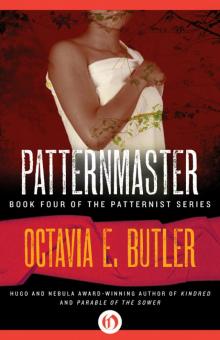 Patternmaster
Patternmaster Survivor
Survivor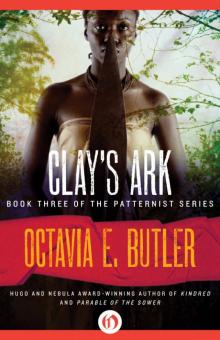 Clay's Ark
Clay's Ark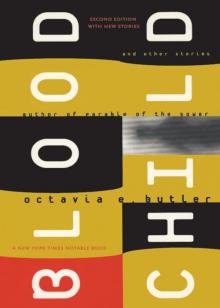 Bloodchild and Other Stories
Bloodchild and Other Stories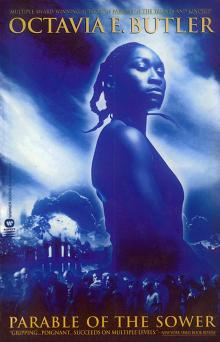 Parable of the Sower
Parable of the Sower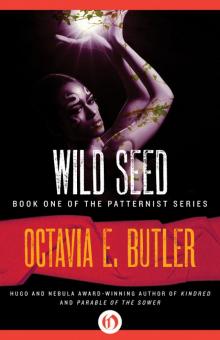 Wild Seed
Wild Seed Fledgling
Fledgling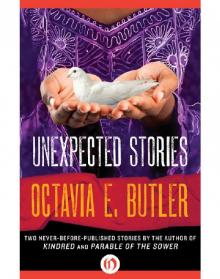 Unexpected Stories
Unexpected Stories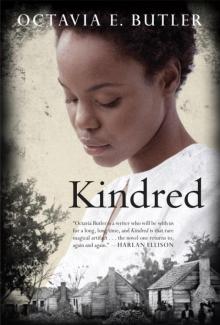 Kindred
Kindred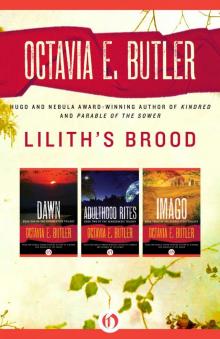 Lilith's Brood: Dawn / Adulthood Rites / Imago
Lilith's Brood: Dawn / Adulthood Rites / Imago Adulthood Rites
Adulthood Rites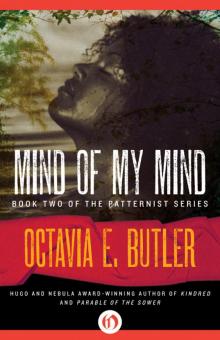 Mind of My Mind
Mind of My Mind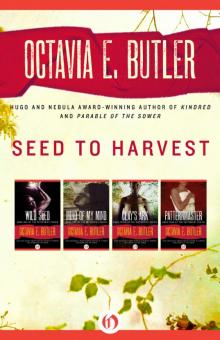 Seed to Harvest
Seed to Harvest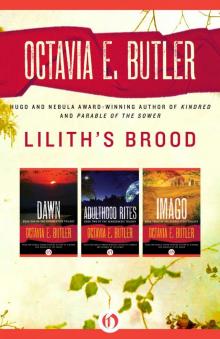 Lilith's Brood: Dawn, Adulthood Rites, and Imago (Xenogenesis Trilogy)
Lilith's Brood: Dawn, Adulthood Rites, and Imago (Xenogenesis Trilogy)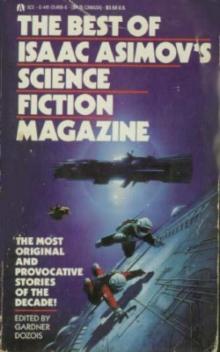 Bloodchild
Bloodchild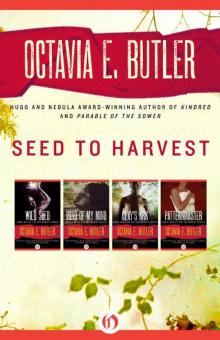 Seed to Harvest: Wild Seed, Mind of My Mind, Clay's Ark, and Patternmaster (Patternist)
Seed to Harvest: Wild Seed, Mind of My Mind, Clay's Ark, and Patternmaster (Patternist)